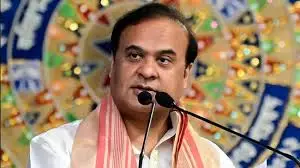Assam elections next year, BJP flags its sweep of rural polls – minority areas included

Guwahati, May 14, 2025 — With Assembly elections in Assam set for early 2026, the Bharatiya Janata Party (BJP) is already projecting confidence, buoyed by what it calls a decisive performance in the recently concluded rural body polls. Party leaders claim that the outcome is not just a mandate from traditional voters but also reflects growing support in regions with significant populations of religious minorities — a demographic that has traditionally voted for opposition parties.
The three-tier panchayat elections, held across Assam in phases over the last two months, witnessed a high voter turnout. The BJP, along with its allies from the National Democratic Alliance (NDA), secured a majority of zila parishad and gaon panchayat seats — especially in areas such as Barpeta, Goalpara, and Dhubri, which are home to a large number of Muslim voters.
BJP’s Rural Surge
Addressing the media in Guwahati, Assam Chief Minister Himanta Biswa Sarma claimed the rural poll results were a “clear endorsement” of the state government’s development agenda, governance reforms, and welfare outreach programs. “For the first time, we are seeing panchayat-level victories in minority-dominated areas. It reflects a shift in trust,” he said.
BJP leaders pointed to their success in districts previously considered strongholds of opposition parties like the Congress and the All India United Democratic Front (AIUDF), especially where religious minorities form over 60% of the population. “This is a historic turning point. We are not just winning, we are breaking the old political myths,” said BJP Assam president Bhabesh Kalita.
Minority Outreach in Focus
The BJP’s claims come amid its increased focus on inclusive schemes and the ‘Sabka Saath, Sabka Vikas’ slogan, which the party has been aggressively promoting in the run-up to 2026. Over the past year, the Assam government has expanded welfare coverage under schemes such as Orunodoi (a monthly financial aid program) and rural housing initiatives in regions with minority concentration.
However, critics argue that the narrative of growing minority support may be premature or overstated. “These elections were highly localized. In many places, people voted for individuals based on community ties or village-level issues, not party ideologies,” said political analyst Dr. Abdul Rauf, a professor at Gauhati University. “It is too early to conclude a wholesale shift.”
Opposition Calls BJP Claims “Misleading”
Reacting to BJP’s celebration, opposition parties have cautioned against reading too much into local body results. Congress state chief Bhupen Borah dismissed BJP’s claims as “political marketing,” accusing the ruling party of using government machinery to influence the polls.
“The rural polls were not fair in many places. There were reports of intimidation and suppression of opposition workers,” said AIUDF leader Badruddin Ajmal. “Our grassroots support remains intact. People will vote differently in the Assembly elections.”
Despite the pushback, BJP leaders say their efforts to engage with all communities, especially through local leaders and welfare beneficiaries, are yielding results. Some within the party see the rural poll results as a validation of their strategy to broaden the voter base ahead of the more crucial Assembly polls.
2026 Elections: The Road Ahead
The 2026 Assam Assembly elections are expected to be a high-stakes contest. The BJP, which came to power in 2016 and retained it in 2021, is aiming for a third consecutive term — a feat that would mark a new chapter in the state’s political history.
The Congress, AIUDF, and other regional parties, meanwhile, are scrambling to regroup after internal rifts and successive defeats. Their challenge will be to counter the BJP’s narrative of development and communal harmony while addressing issues such as job creation, education, and land rights that resonate deeply in both rural and minority-majority constituencies.
Analysts suggest that if the BJP can consolidate its rural base — including sections of the Muslim population — it could severely weaken the opposition’s vote bank, particularly in lower Assam. However, much will depend on how issues like the National Register of Citizens (NRC), Citizenship Amendment Act (CAA), and land eviction drives play out over the next few months.
Ground Sentiment: Mixed Reactions
On the ground, reactions from voters in districts like Morigaon and Bongaigaon offer a mixed picture. While some rural voters praise the BJP’s welfare initiatives and say they feel more included than before, others express concern about identity-based policies and their long-term implications.
“I received the Orunodoi benefit this year, which helps with household expenses,” said Rehana Begum, a resident of Goalpara district. “But I am still unsure how safe our future is with the constant talk of CAA and eviction.”
In contrast, Abdul Karim, a small farmer in Barpeta, said he voted for a BJP-backed panchayat candidate for the first time. “We need roads, schools, and jobs — not speeches. If the BJP can deliver, we will support them.”
Conclusion
As Assam gears up for another politically charged election cycle, the BJP’s early momentum from the rural polls may give it a psychological edge. However, whether this local success translates into a full-fledged mandate across the state — especially in regions historically wary of the BJP — will depend on how inclusive and impactful its policies prove to be in the coming months.
For now, the message from the BJP is clear: they are preparing not just to defend their ground, but to expand into new political territory — minority regions included.






